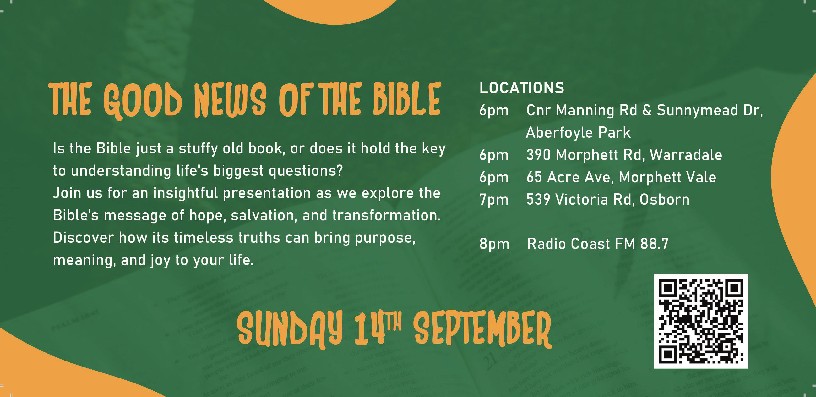This important presentation will be given at various locations around Adelaide on Sunday 14th September 2025.


This presentation will be given at the these locations
Christadelphian Hall, Cnr Manning Rd and Sunnymeade Drive, Aberfoyle at 6:00 pm and will also be streamed on YouTube using this link; https://www.youtube.com/@aberfoyleparkchristadelphi1518/featured
Christadelphian Seminar Centre, 390 Morphett Rd, Warradale at 6:00 pm and will also be streamed on YouTube using this link; https://www.youtube.com/watch?v=EobJPNvT_2M
Wakefield House Positive Aging Centre, 65 Acre Ave, Morphett Vale at 6:00 pm and will also be streamed Online via ZOOM: https://zoom.us/i/3187934984 Meeting ID: 3187934984 Email: hvgospel@gmail.com to get password
Christadelphian Hall, Cnr Hillendale & Endeavour Dr, Wynn Vale at 5:00 pm and will also be streamed on YouTube using this link: https://www.youtube.com/channel/UCqOSnA5vKIMdfzqwRbaGwVA
539 Victoria Rd, Osborne at 7:00 pm and will also be streamed on YouTube using this link: https://www.youtube.com/channel/UCwRTywBeNt_ZjWZ8jZnW61A
Christadelphian Hall, 2 Park St, Hyde Park at 2:00 pm and will also be streamed on YouTube using this link: https://www.youtube.com/@HydeParkChristadelphians/streams
This presentation will also be put to air on our Program “Bible Spotlight” at 8:00 pm on Radio Coast FM 88.7 or listen live online: http://streaming1.coastfm.com.au:8000/broadwavehigh.mp3